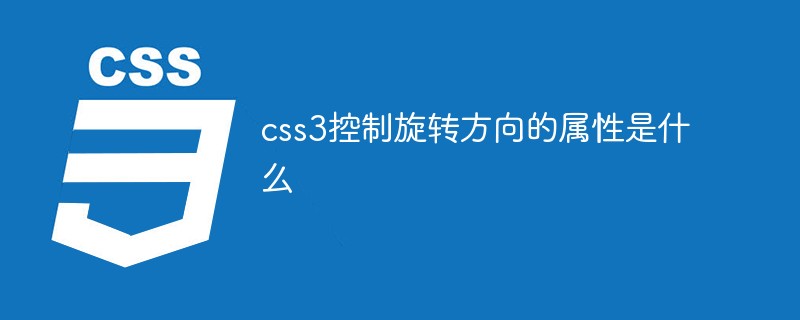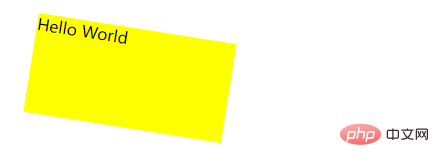What is the attribute that controls the rotation direction in css3
The attribute that controls the rotation direction of css3 is the transform attribute; this attribute is used in conjunction with the scale() method to control the 2D rotation direction of the element, and this attribute is used in conjunction with the scale3d() method to control the 3D rotation direction of the element. The syntax is "transform:rotate3d(x,y,z)".

The operating environment of this tutorial: Windows 10 system, CSS3&&HTML5 version, Dell G3 computer.
What are the attributes of css3 that control the direction of rotation?
In CSS3, you can use the transform function to achieve four types of deformation processing: rotation, scaling, tilting, and movement of text or images.
Browser support
So far: Safari3.1 or above, Chrome8 or above, Firefox4 or above, Opera10 or above browsers support this attribute.
2d rotation
Use the rotate method and add the angle value to the parameter. The angle value is followed by the "deg" text indicating the angle unit. The rotation direction is sequential. clockwise direction.
transform:rotate(45deg);
3D rotation
Use the rotateX method, rotateY method, and rotateZ method respectively to rotate the element around the X-axis, Y-axis, and Z-axis, and add the angle value to the parameters , the angle value is followed by the deg text indicating the angle unit, and the rotation direction is clockwise.
transform:rotateX(45deg); transform:rotateY(45deg); transform:rotateZ(45deg); transform:rotateX(45deg) rotateY(45deg) rotateZ(45deg); transform:scale(0.5) rotateY(45deg) rotateZ(45deg);
The example is as follows:
<html>
<head>
<style>
div
{
margin:30px;
width:200px;
height:100px;
background-color:yellow;
/* Rotate div */
transform:rotate(9deg);
-ms-transform:rotate(9deg); /* Internet Explorer */
-moz-transform:rotate(9deg); /* Firefox */
-webkit-transform:rotate(9deg); /* Safari 和 Chrome */
-o-transform:rotate(9deg); /* Opera */
}
</style>
</head>
<body>
<div>Hello World</div>
</body>
</html>Output result:

css video tutorial)
The above is the detailed content of What is the attribute that controls the rotation direction in css3. For more information, please follow other related articles on the PHP Chinese website!

Hot AI Tools

Undresser.AI Undress
AI-powered app for creating realistic nude photos

AI Clothes Remover
Online AI tool for removing clothes from photos.

Undress AI Tool
Undress images for free

Clothoff.io
AI clothes remover

Video Face Swap
Swap faces in any video effortlessly with our completely free AI face swap tool!

Hot Article

Hot Tools

Notepad++7.3.1
Easy-to-use and free code editor

SublimeText3 Chinese version
Chinese version, very easy to use

Zend Studio 13.0.1
Powerful PHP integrated development environment

Dreamweaver CS6
Visual web development tools

SublimeText3 Mac version
God-level code editing software (SublimeText3)

Hot Topics
 1387
1387
 52
52
 How to use bootstrap in vue
Apr 07, 2025 pm 11:33 PM
How to use bootstrap in vue
Apr 07, 2025 pm 11:33 PM
Using Bootstrap in Vue.js is divided into five steps: Install Bootstrap. Import Bootstrap in main.js. Use the Bootstrap component directly in the template. Optional: Custom style. Optional: Use plug-ins.
 The Roles of HTML, CSS, and JavaScript: Core Responsibilities
Apr 08, 2025 pm 07:05 PM
The Roles of HTML, CSS, and JavaScript: Core Responsibilities
Apr 08, 2025 pm 07:05 PM
HTML defines the web structure, CSS is responsible for style and layout, and JavaScript gives dynamic interaction. The three perform their duties in web development and jointly build a colorful website.
 How to write split lines on bootstrap
Apr 07, 2025 pm 03:12 PM
How to write split lines on bootstrap
Apr 07, 2025 pm 03:12 PM
There are two ways to create a Bootstrap split line: using the tag, which creates a horizontal split line. Use the CSS border property to create custom style split lines.
 Understanding HTML, CSS, and JavaScript: A Beginner's Guide
Apr 12, 2025 am 12:02 AM
Understanding HTML, CSS, and JavaScript: A Beginner's Guide
Apr 12, 2025 am 12:02 AM
WebdevelopmentreliesonHTML,CSS,andJavaScript:1)HTMLstructurescontent,2)CSSstylesit,and3)JavaScriptaddsinteractivity,formingthebasisofmodernwebexperiences.
 How to resize bootstrap
Apr 07, 2025 pm 03:18 PM
How to resize bootstrap
Apr 07, 2025 pm 03:18 PM
To adjust the size of elements in Bootstrap, you can use the dimension class, which includes: adjusting width: .col-, .w-, .mw-adjust height: .h-, .min-h-, .max-h-
 How to use bootstrap button
Apr 07, 2025 pm 03:09 PM
How to use bootstrap button
Apr 07, 2025 pm 03:09 PM
How to use the Bootstrap button? Introduce Bootstrap CSS to create button elements and add Bootstrap button class to add button text
 How to set up the framework for bootstrap
Apr 07, 2025 pm 03:27 PM
How to set up the framework for bootstrap
Apr 07, 2025 pm 03:27 PM
To set up the Bootstrap framework, you need to follow these steps: 1. Reference the Bootstrap file via CDN; 2. Download and host the file on your own server; 3. Include the Bootstrap file in HTML; 4. Compile Sass/Less as needed; 5. Import a custom file (optional). Once setup is complete, you can use Bootstrap's grid systems, components, and styles to create responsive websites and applications.
 How to insert pictures on bootstrap
Apr 07, 2025 pm 03:30 PM
How to insert pictures on bootstrap
Apr 07, 2025 pm 03:30 PM
There are several ways to insert images in Bootstrap: insert images directly, using the HTML img tag. With the Bootstrap image component, you can provide responsive images and more styles. Set the image size, use the img-fluid class to make the image adaptable. Set the border, using the img-bordered class. Set the rounded corners and use the img-rounded class. Set the shadow, use the shadow class. Resize and position the image, using CSS style. Using the background image, use the background-image CSS property.




